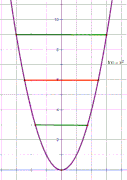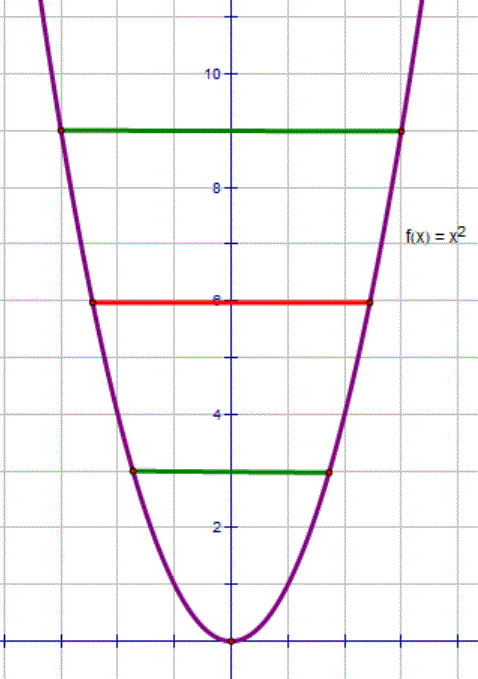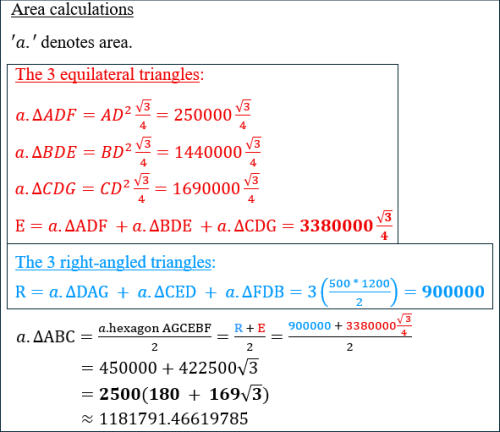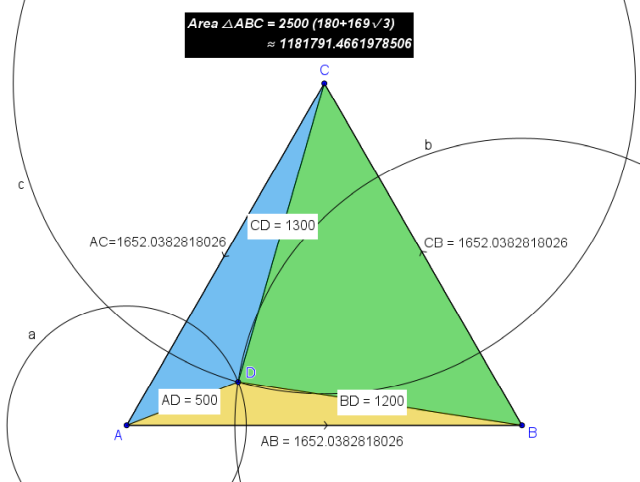Math Is Fun Forum
You are not logged in.
- Topics: Active | Unanswered
#1 Re: Exercises » Bitter areas. » 2026-03-02 01:36:10
A is right; there isn't enough data to identify the area in a unique way.
The equilateral triangle's size is not uniquely fixed by the distances to its three vertices.
As a result, the area cannot be calculated using the information provided.
I googled this puzzle last October, and found that it has appeared in different guises over many years; eg, on websites such as Artofproblemsolving, math.Stackexchange and Reddit. The three internal-point-to-vertex lengths I saw on those three sites were Pythagorean triples (bobbym's {500, 1200, 1300} is one), which opens up the use of a particular solution strategy (eg, see my geometric solution in post #19).
Last week I found that solutions to puzzles like this are also possible for other number combinations: eg,
(a) non-Pythagorean triples (there's a solved {5, 6, 7} on Quora)
(b) non-integer numbers (eg, {123.4, 789.012, 800.08}...area ΔABC ≈ 649690mi²).
The above examples (a) & (b) solve readily with the Mathematica codes in my post #4 and in ElainaVW's post #12...and those codes, which use solution strategies very different from each other, yield identical results. ![]()
#2 Re: Help Me ! » English translation of Apollonius’s Conics » 2026-02-14 11:23:35
Sorry, KerimF, but I don't know why you can't see certain images, nor how to solve that problem. ![]()
#3 Re: Help Me ! » English translation of Apollonius’s Conics » 2026-02-05 13:07:38
I can't see any of your 6 images.
Well, I didn't expect that!
I joined MIF in 2009, and have always been able to see the images in posts...not that I read all the posts!
Are you able to see the images in other threads? eg:
1. Here, which is the previous thread in which you posted. I counted 8 images in post #1.
2. Bitter areas, which has 1 image in post #4 (in the hide box), 1 image in post #18, and 5 images in post #19. This thread also contains a discussion I had with Bob about the file host Imgur having banned the UK.
#4 Re: Help Me ! » English translation of Apollonius’s Conics » 2026-01-30 14:19:51
Hi KerimF;
For instance, on my side, I also don't see both images.
Do you see these 2 images that I'm posting from down here in Australia? I'm just wondering if Bob's locality (the UK) has anything to do with both you and the OP not being able to see his images.
So here they are (using my PC, I hovered my mouse over each image in Bob's post #15, right-clicked, selected 'Copy image address', and pasted the address into this post (#19) between 'img' tags):
1 
2 
Btw, the file host for the image in post #1 is Imgur, while for posts #4, #8, #10 & #15 it's Postimages. Bob & I have switched from Imgur because "from September 30, 2025, access to Imgur from the United Kingdom is no longer available" (see here). We now use Postimages...we'll see how that goes.
Here are other troubleshooting options I thought I'd try, this time using links from my Postimages account, into which I uploaded them just today:
There are 2 images in this main post and 2 in each of the 'Hide' tags...and I can see all 6 images (with my sunglasses on or off). ![]()
How about anyone else? Which images can you see?
Please let me know (I've numbered them all).
#5 Re: Help Me ! » English translation of Apollonius’s Conics » 2026-01-26 20:46:49
Hi Bob;
FWIW:
Can you see this image?
And what about this?
I can see both images.
The first looks small and a bit blurred for me.
The second is larger and much sharper.
They seem to be the same image displayed at 2 different sizes. On my PC, #2 displays at ≈ 14.2 times the size of #1 (ie, #2 @ 478 x 679 x 32 BPP, and #1 @ 127 x 180 x 32 BPP).
Hence the huge difference in sharpness.
#6 Re: Help Me ! » English translation of Apollonius’s Conics » 2026-01-21 01:31:39
Hi Bob;
I did exactly as you did, testing all the Postimages link options, but had to go out before I could post about it...and you beat me to it.
We really need to have Hannibal's answers to your questions before going much further, but here's some info anyway in case it helps:
- My Android smartphone gives me several options if I do a long press on your image: eg, 'Download image', 'Copy image', and 'View image'.
- On my PC, right-clicking your image also gives some options: eg, 'Save image as' and 'Copy image'.
Btw, I've noticed you've changed your image to a better quality one. ![]()
EDIT: Something I should've said about my test results that might be helpful: any Postimages link that displayed just your image here on MIF did so only when BBCode 'img' tags were used. When used outside of MIF, any links that displayed the image at all always showed it within a full Postimages web page (along with other content).
#7 Re: Help Me ! » English translation of Apollonius’s Conics » 2026-01-19 18:24:19
Hi Bob;
Success with posting image:
Your image displays fine for me, but its code is in live url tags and clicking the image opens a Postimages webpage containing the image (amongst other things!)
This is the correct code for just the image:
[img]https://i.postimg.cc/4KJ9rhFk/symmetry-on-parabola.gif[/img]Postimages has an img-tag issue that I mentioned here, but I probably wasn't clear enough. Fixed now. ![]()
#8 Re: Exercises » Bitter areas. » 2025-12-14 00:03:45
Hi Bob;
I've checked all my posts and I'm blocked from viewing every Imgur image!..........I haven't had a chance to check yet, but as I read it, I won't be able to log in to Imgur either.
From Reddit.com's Imgur blocks access to UK users after proposed regulatory fine:
A help article on Imgur's US website, seen by the BBC, states that "from September 30, 2025, access to Imgur from the United Kingdom is no longer available".
"UK users will not be able to log in, view content, or upload images. Imgur content embedded on third-party sites will not display for UK users."
What site are you now using?
https://postimages.org/, and so far, so good (well, nearly). Some points:
1. Registering enables using galleries.
2. Their hotlinks don't include a BBCode img-tag option. Using the last drawing in my post #19 above:
(a) This is their Direct link code (fix: just add the img tags to that code):
https://i.postimg.cc/XvG40LTx/4a.png(b) This is their Hotlink for forums code (fix: just delete the url tags from that code):
[url=https://postimages.org/][img]https://i.postimg.cc/XvG40LTx/4a.png[/img][/url]The fix for both cases (a) & (b) above gives the following code:
[img]https://i.postimg.cc/XvG40LTx/4a.png[/img]3. Image resizing is possible (but limited), and must be done before upload (Imgur's is after upload, making results easier/faster to analyse). Also, their resize compression spoils the image somewhat, and so I pre-sized the post #19 images with IrfanView (my image viewer) for better quality.
And how long before that bans the UK too.
I'm now very happy that I have originals of all my Imgur images in a folder (have done similar for Postimages). That way, my images are always available for alternative file host solutions, should the need arise.
#9 Re: Exercises » Bitter areas. » 2025-12-13 00:27:23
Hi Bob;
I started using Imgur in late Feb 2017, and have 304 images stored there.
Most of them are on MIF posts, and, from what you've found and from what's reported on Reddit and elsewhere about Imgur's UK ban, they're probably all now invisible to UK members.
I did some testing down here via a VPN set to several different UK locations, but that failed as all my images (over a large range of dates) remained visible to me.
Maybe I'll cherry-pick a post or three to 'fix' my invisible images for UK-ians by changing them over to a non-Imgur file host...like I've done in this thread.
I wonder if Imgur's UK ban is permanent?
Of course, while the ban is in place, I won't be using Imgur for a global audience.
![]()
#10 Re: Exercises » Bitter areas. » 2025-12-11 11:32:39
Hi Bob,
I'm getting a 'Content Not Viewable In Your Region' message instead of your Imgur images. Any idea why that is happening?
Yes...but only after googling it a few moments ago.
From Reddit.com: Imgur blocks access to UK users after proposed regulatory fine.
Not sure exactly what to do about that from down here, but Reddit gives some suggestions for UK-ians: Imgur alternatives for UK users.
Well...that's all VERRRRRRY annoying!!!!!! ![]()
EDIT: I'm trying another file host: https://postimages.org/, and have changed the images in this thread over to them. Do my images show up for you now? There are 5 in post #19, 1 in post #18, & 1 hidden one in post #4.
#11 Re: Exercises » Bitter areas. » 2025-12-10 21:23:28
Hi mycalsuite;
The three internal-point-to-vertex lengths are often a Pythagorean triple (bobbym's {500,1200,1300} is one), opening up the use of a particular solution strategy.
Here's a geometric solution...
1. Draw large △ABC, consisting of 3 smaller coloured triangles △BAD, △CBD & △ACD that connect to inner point D where the explosion occurred, with AD = 500, BD = 1200 & CD = 1300.
2. (a) Rotate the 3 coloured triangles 60° clockwise:
(i) the gold around point B, producing point E and forming the 60° ∠EBD.
(ii) the green around point C, producing point G and forming the 60° ∠GCD.
(iii) the blue around point A, producing point F and forming the 60° ∠FAD.
(b) These rotations together form outer hexagon AFBECG, whose total area is exactly twice that of △ABC.
3. Draw lines DE, DG & DF to complete triangles △DBE, △DCG & △DAF, respectively.
(a) These 3 triangles are equilateral as they're isosceles with a 60° included angle at B, C & A, respectively.
(b) The remaining regions of the hexagon — the 3 triangles △DEC, △BDF & △GAD — are congruent right-angled triangles, each with sides {500,1200,1300} — a Pythagorean triple.
4. The area of the hexagon is the sum of:
(a) the areas of its 3 equilateral triangles, and
(b) the areas of its 3 congruent right-angled triangles.
5. The area of △ABC = ½hexagon = 2500(180+169√3) ≈ 1181791.46619785mi²

#12 Re: Exercises » Bitter areas. » 2025-10-22 00:53:19
Hi mycalsuite;
A is right; there isn't enough data to identify the area in a unique way.
The equilateral triangle's size is not uniquely fixed by the distances to its three vertices.
As a result, the area cannot be calculated using the information provided.
By "not uniquely fixed", do you mean that multiple solutions are possible?
If so, do you have an example you could post?
Bobbym (OP), thickhead, ElainaVW and I have all arrived at the same single solution, ElainaVW's 2500√3(169+60√3) being slightly less simplified than the others' 2500(180+169√3).
Here's the Geogebra drawing I mentioned in post #4:

The Geogebra measurements check out...
#13 Exercises » Applied Maths: Find base cost, given nett after levies & commission » 2025-10-18 21:42:27
- phrontister
- Replies: 0
The nett cost (N) of a property's fire insurance policy comprises the following components:
P = Premium (the base cost)
F = Fire Services Levy (f% of the Premium)
S = Stamp Duty (s% of the combined Premium & Fire Services Levy)
C = Commission (c% of the Premium)
And N = P + F + S - C.
A policyholder pays $1224.81 nett (N), where...
f = 2.5%
s = 11%
c = 15%
Q1. What is the amount of the policy's Premium (P) component (ie, the base cost)?
Q2. What's the shortest algebraic formula you can make to solve Q1?
Note: The formula must include rate variables f, s & c.
#14 Re: Help Me ! » Problem of permutation and combination » 2025-10-03 16:05:20
Hi Bob;
That makes 10 ways.
Isn't each of your 20 lines a distinct permutation, making 20 ways?
If so, that yields 20 * 3 = 60...and 60 + 90 = 150.
#15 Re: Help Me ! » Inserting an image -- ? » 2025-09-25 14:47:58
Hi all;
I've updated a couple of steps in the post #4 that I referred to in my previous post.
The main change is to Step 5, which is now "Long-press the image, & select 'View image' ".
It previously said to select 'Review image', which I recently found doesn't always appear in the drop-down menu from the long-press. 'View image' does (at least it did in all my tests, which were quite a few).
The change to Step 5 then led to a change in Step 6, which is now simpler.
I hope the step sequence works on phones other than mine! ![]()
#16 Re: Help Me ! » Inserting an image -- ? » 2025-09-19 18:03:40
#17 Re: Help Me ! » Image test 2 » 2025-09-19 17:30:56
Hi Bob;
Yay! I've done this totally on my phone.
Me too! ![]()

The image is of the North Sydney Olympic Pool & the nearby Sydney Harbour Bridge on a nice, clear day, compared to what they looked like during the enormous Eastern Australian red dust storm in September 2009.
Here's the code I used to display the image:
[img]https://i.imgur.com/Z0HakbV.jpeg[/img]BTW, I uploaded my image to Imgur, and obtained their image link (minus the BBCode image tags), without logging in to Imgur.
The steps in my Samsung Galaxy A35:
1. Go to Imgur.com
2. Press the Upload button (an arrow pointing up from a flat tray).
3. Select the image from its location on your phone (eg, Gallery).
4. Press 'Done', & wait until both the image & 'Upload Complete!' display.
5. Long-press the image, & select 'View image'.
6. Press the address in the address bar (it will change to a highlighted url of the image file).
7. Press the 'Copy' button immediately right of the file url ('Copied to clipboard.' will then display lower down the page).
8. Paste the copied file url into your MIF post, inside BBCode square image tags (like in the code shown above).
No doubt the steps are phone-dependent (or some such)! ![]()
#18 Re: Help Me ! » Surds » 2025-07-22 16:50:58
Hi Paul;
First off, sorry for the giant image
I resized it in Windows but it kept coming out huge
I don't know the reason for that happening here on MIF ![]() , but this is what I do to get the approx size I want for my display:
, but this is what I do to get the approx size I want for my display:
1. Crop out what I don't need displayed (using M$ Paint, or some such). Cropping your image reduced it from 800px x 1778px to 743px x 530px, which removed about 72% of the original area!
2. Upload the cropped version to Imgur.
3. Enter Imgur's BBCode image link into my MIF post, and before pressing Submit, click Preview to assess image size.
4. If I want to change the image size, then immediately before the full stop of the image extension (eg, .jpeg, .png) I insert one of the following letters:
s (Small square)
b (Big square)
t (Small thumbnail)
m (Medium thumbnail)
l (Large thumbnail)
h (Huge thumbnail)
I copied your image, cropped it, and uploaded it to my Imgur.
To resize that image from original to medium, its original link https://i.imgur.com/8adTo66.jpg would become https://i.imgur.com/8adTo66m.jpg (note the inserted 'm' before the extension's full stop).
Here's the cropped image at original size: 
And here's the image shrunk to medium size:
And here are the displays for all 7 size options (including the original) based on the cropped rectangular image I uploaded to Imgur:
You'll notice that the left and right sides of the 'small square' and 'big square' images are cropped. Unfortunately, Imgur does that automatically on rectangular images whose width exceeds their height, so if such cropping matters, either:
(a) don't use the 'small square' or 'big square' options on the rectangular image, or
(b) convert the rectangular image to a square (eg, by adding false top &/or bottom with image software).
Is using imgur.com a good way to post images here?
Is there a better alternative?
I've used Imgur since 2017, and think it gives a very good file host service.
They've changed their webpage layout to a somewhat confusing one that I haven't totally sussed out, but (lucky for me) on one of their pages (I forget which one) they give an option to use their old style...which I select straight away!
I don't know of a better alternative file host.
I use a PC &/or laptop. I've only had a 'smart'phone for a few months and am still learning it, so if you're on one of those things and have Qs about what I've said, we may need someone else (Bob?) to help out. ![]()
#19 Re: Puzzles and Games » Add 13 more and post it forever. » 2025-04-27 03:04:58
30225
#20 Re: Help Me ! » Can u find the word? » 2025-04-03 11:09:59
Hi punhub85;
Any chance there's a word that has a, e, i, o, u, y in order?
Yes...the adverbial forms of the two adjectives you mentioned ('facecious' & 'abstemious') fit: 'faceciously' & 'abstemiously'.
For hyphenated words, there's also the adverb 'half-seriously' (from the adjective 'half-serious').
Collins Dictionary (a British dictionary) has 'halfseriously' but not 'halfserious', only the hyphenated 'half-serious'! ![]()
The unhyphenated 'halfseriously' is valid in Scrabble games where British words are used.
#21 Re: Help Me ! » Dinner puzzle....Please help! » 2025-02-28 01:18:56
Hi Kerim;
Isn’t it a solution?
Well, not really, unless the "I would like" in Nick's "I would like everyone to meet at least once" is only a desire, not a requirement.
01 doesn't meet 08, 15 & 22
08 doesn't meet 01, 15 & 22
15 doesn't meet 01, 08 & 22
22 doesn't meet 01, 08 & 15
02 doesn't meet 09, 16 & 22
09 doesn't meet 02, 16 & 22
etc, etc.
Ditto for 01, 08, 15 & 22 in your post #16.
Also, in post #16, guest 02 only meets 01, 03, 04, 05, 06, 07, 08, 15 & 22, and fails to meet any of the other 18 guests.
Just looking quickly, 03 does much the same as 02.
I didn't check further...
#22 Re: Help Me ! » Dinner puzzle....Please help! » 2025-02-26 03:12:41
I've done the following in Excel (spreadsheet...by hand, coz I don't know how to code progressive dinners): 
Guests are numbered 1-28, and are colour-coded green (1-7), peach (8-14), blue (15-21), pink (22-28).
All guests attend all 4 courses and all 4 houses (the image shows all guests 1-28 in each of the courses and in each of the houses). They do this in groups of 7 (of which there are 16, all unique).
No one attends...
(a) the same house more than once, nor
(b) the same course more than once.
Everyone...
(a) fails to meet many of the other guests, and
(b) meets several guests more than once (the colour-coding helps identify that).
...at least 8 in some venues is needed.
So far I haven't come up with a plan using 8 people at each venue.
Same here... ![]()
#23 Re: Help Me ! » Is velocity ever a scalar quantity? » 2025-02-24 02:10:57
Any ideas on the dinner party post?
Sorry Bob, but I've got no real clues on how to go about solving that one.
I don't know how to solve progressive dinners with formulas (bobbym had some success, with Mathematica).
And so I tried with Excel (like I've done successfully with a couple in the past), but no such luck this time.
#24 Re: Help Me ! » Is velocity ever a scalar quantity? » 2025-02-19 10:25:42
Echo_23's last post (#13) appends a paragraph that doesn't appear in paulb203's post #1...
#25 Re: Help Me ! » How many integers between 1 and 999 have 3 divisors? » 2025-01-21 08:18:34
Do you study about computer science?
No, not at all.
I just love doing number puzzles, with or without computer aided software.
For me, tackling a challenging number puzzle is simply a nice way to relax. ![]()